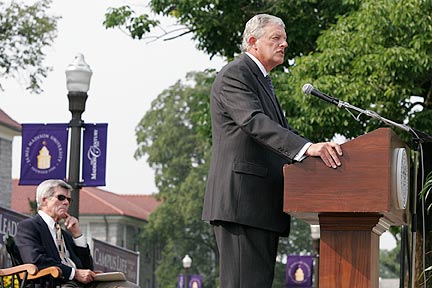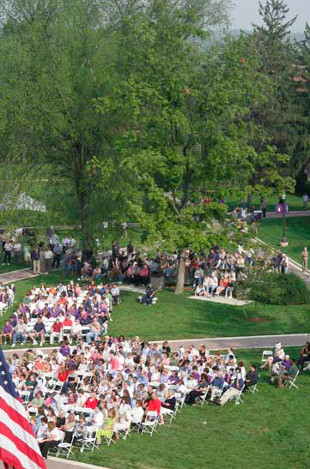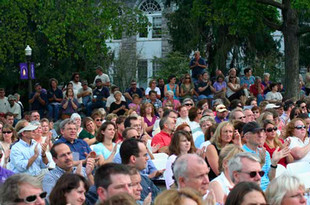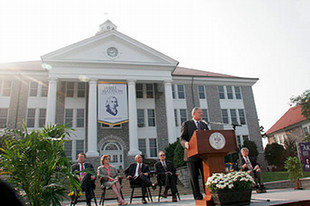
Welcome to all, and special greetings to those who are joining us as new faculty or staff members. Please join me in thanking the Madison Brass for our musical selections before the program.
Today, we begin a new year. Not a typical new year, but the beginning of our 100th year. Hence, our coming together as one, both faculty and staff, on this historic quadrangle, in recognition of this special time in the life of our institution.
On March 14, 2008 we will commemorate our founding, and between now and then we will have numerous opportunities to celebrate the milestones of our development over the years. A schedule of many of the events and activities was on your seat when you arrived.
I want to recognize Fred Hilton and the members of the various anniversary committees who have planned our events for the year. Please join me in thanking them for their work on our behalf.
I don't usually ask the Vice Presidents to sit on the platform at this meeting, but I asked them to do so today so that they might be recognized for the leadership that they provide. It is my pleasure to work with each of them.
Permit me to introduce Provost and Vice President for Academic Affairs, Dr. Douglas Brown, and Senior Vice Presidents, Dr. Mark Warner, Mr. Charles King, and Dr. Joanne Carr.
If I may, I would also like to introduce Linda Bland, wife of our guest speaker today, and Judith Rose, the First Lady of JMU.
Given the uniqueness of this occasion, I requested of Dr. Brown that we dispense with the normal greetings, introductions, and announcements, as important as they may be, and instead focus our thoughts on our past and our future.
To help us do just that I invited Dr. Sidney Bland, professor of History, to consider our past, to contemplate its significance and to share a few of his reflections with us this morning. Many of you know Sidney. He has been a member of the Madison faculty since 1965. He received his formal collegiate education at Furman University, the University of Maryland and the George Washington University. Much of his scholarship has focused on the personalities and history of one of my favorite cities, Charleston, SC.
Those who have worked with him regard him as a respected colleague and an accomplished educator and he is both appreciated and admired by his students. It has been our good fortune to have counted him as one of "us" for forty plus years. Dr. Bland will come directly to the lectern following a special treat that we have this morning.
Our own Dr. Eric Ruple will now accompany Dr. Carrie Stevens in performing "Oh Shenandoah." Dr. Ruple will be playing a very special Art Case Steinway piano commissioned by Dr. Elizabeth Swallow. You may recall that it was through Dr. Swallow's philanthropy that we were able to acquire a number of Steinway pianos and that her gift ultimately led to our designation as a "Steinway School of Music."
Dr. Swallow is with us this morning. Please join me in recognizing her for her generosity and for her love of music. In addition to listening to this piano and Dr. Stevens, I invite you after the program to take a closer look at the piano's beautiful art work and finish.
And now, "Oh Shenandoah," followed by Dr. Bland.
Thank you Professor Bland. We appreciate both your own scholarly contributions to our institutional history and your recounting of some of its highlights with us this morning.
Today, we bask in the glow of the achievements of the faculty, staff and students who have preceded us. Their actions, singular and collective, have propelled us on a trajectory to greatness. We sit on this historic quad, this mystic garden of learning, where so many have crossed through tunnels, on boardwalks and on sidewalks, and since the sixties, on the grass!
Unlike the image Dr. Bland described of our early days, we are surrounded now by these stately halls of contemplation, where the sun has risen and set over 36,000 times since our founding. We have witnessed years of prosperity, and we have known the challenges of economic recession and decline. Based on Governor Kaine's revised revenue forecasts, we know that harder times are once again headed our way.
Through these peaks and valleys in resource allocation, our dedication to students has been as reliable as the sun's travel across this sky each day. That commitment alone has been fuel sufficient to motivate our quest for the discovery of new truths, to transfer knowledge to others eager to learn, and to inspire the intellect and passion of those who seek understanding.

What would John Wayland, Cornelius Heatwole, and Yetta Shoninger, President Burruss's first three faculty hires think of us today? Could they have possibly imagined that their Normal School would become an enterprise of over 3.8 million square feet and 150 buildings on 675 acres?
Could they have reasonably considered that 100 years later, over 100,000 degrees would have been conferred? That we would enroll over 17,000 students, employ over 2,400 full time faculty and staff, and offer 90 academic programs?
Perhaps more importantly, would they have been able in their wildest imaginings to think that our 9,509 parking spaces would still not be sufficient to meet our parking needs?
Dr. Bland mentioned Wilson Hall, behind me. In 1929, President Duke secured the appropriation to build Wilson Hall. The signature building of our campus cost a mere $250,000 to construct. This year we will expend over $350 million dollars to operate the University. The new Center for the Performing Arts to be located behind you to complete this quad will cost over $80 million dollars.
What would Nannie Sword of Lee County, the first of the 150 young ladies in the inaugural class think about the university of today? I can assure you that her parents could not have imagined that the cost of their daughter's education in Harrisonburg would have escalated from the $6.00 for tuition per year and $14.00 a month for room and board to today's annual charge of $13,500!
Yes, things have changed. Today we are a nationally recognized institution of higher learning regularly cited for excellence and value. How did it happen? It was you... it was you.
Of course, we all know that acreage owned, square footage attained and buildings constructed suggest nothing about excellence and value. Excellence and value are the products of people - the faculty, staff and students, and the programs and activities that occur in this footprint that we call James Madison University. We have been fortunate to have called some extraordinary people our faculty and our staff.
Let me ask those of you who have served this institution for 10 years or more to stand. We all owe you, and those who have come before you, a debt of gratitude. You and they have built, through the application of talent and toil, a university of which anyone would be proud. This accomplishment should not be taken lightly; it is uncommon to have progressed as we have in only 100 years. This beautiful campus, its grounds and its buildings, its colleges and programs, combined with a faculty and staff unmatched in this country represents the best of American higher education.
Others do wonder with amazement at our successes. I know, because they call me and ask how we did this or that! Some might even suspect that the Latin term above the pyramid on the dollar bill that translated means "providence has favored our undertakings," is behind it all.
While we might favor a little "divine intervention" to help us along our way, I do not believe that what we have achieved has come from "God kissing our brow." I do not believe that we have been "hard-wired" for success, or that we are a product of some organizational DNA that predestined 21,000 admissions applications for 3,850 freshman slots. No, I am sure that our experience is the product of wise choices and the exceptional execution of our mission, not to mention our deep and abiding affection for the process of learning.
As I have discussed at previous meetings like this one, we are unlike most other institutions. I am proud of it and I hope you are as well.
Virtually no other institution of our size has the graduate/undergraduate mix that characterizes our enrollment. That, combined with our admissions selectivity and graduation rate places us among just a handful of premier public institutions in the nation. Our popularity among students is a product of student satisfaction with their JMU experience and we are the envy of many universities in that regard.
As we have developed, and here I am borrowing from one of my favorite contemporary songwriters, Van Morrison, we have not been bound by any definition, we have not been modeled by convention, nor likened unto any other. In fact, I think it true that we have never really aspired to be like another existing college or university, instead, while we have dramatically changed and adapted over the years, we have always been true to our fundamental purpose and values and we have set our own course. It has served us well!

To those who have joined this splendid endeavor in the last 10 years, remember, in honor of those who have come before you and those who now work with you as colleagues, that being born on third base isn't the same as hitting a triple, and inheriting a fortune is not the same as thinking you are a self-made man or woman.
You have a tremendous obligation. It is now incumbent upon you to propel this institution forward into its second century – The Madison Century. Will we falter or will your creativity and commitment to excellence lift us still higher?
The trouble with success is that it can actually foster a confidence and sense of security that can prevent us from achieving more success. As Marshall Goldsmith has observed, "we get positive reinforcement from our past successes, and, in a mental leap that's easy to justify, we think that our past success is predictive of great things in our future... it blinds us to the need for change."
With that caution, let me suggest to you that James Madison University can well emerge as one of the great universities of the Nation in the 21st century. Not to replace the wonderful liberal arts colleges that share their history with the history of our nation, nor to replace the large research institutions that have emerged as world leaders in innovation in the last fifty years, but to add a new and complementary dimension to higher learning.
I believe that the great universities of this century will be those that engage with their communities and the greater society to transform the power of knowledge into civic action that address the "big problems" of our time.
Problems such as those related to energy, environment, disease, poverty and global conflict. Madison is well positioned to take its place among these new "engaged" universities. I am beginning my tenth year as president of JMU and I can tell you that I am still amazed every day by the work you do. You possess more than educated minds, you have the compassionate hearts, innovative spirits and unrelenting wills necessary to improve our world.
We need to look no further than to our first president, Julian Ashby Burruss, for motivation. In writing about the school he would lead, he stated that the new school could "no longer be confined to theory and books, but must seek its material in real things, in nature, in practical activities of industry and commerce, in the business, civic and social interest of life."
Please do not misunderstand me, seeking knowledge to find truth is justification enough for the undertaking, but to neglect the transformation of that knowledge into tools for improvement of the human condition is akin to an artist's or athlete's unrealized potential. Therein lies, I think, our path to a distinguished future.
Here, the study of arts, the humanities, and the social sciences, truly highlights what it means to be human – examining society's potential and its challenges as well as differences and commonalities. Here we are producing some of the very best teachers in the country who are dedicating their lives to the enhancement of society through the education and enlightenment of young minds.
Here, we are researching sources of alternative energy and examining how we can secure the safety of our citizens. Here, we focus not just on the business enterprise and commerce, but also on the ethical conduct that must set the standard for business leaders of the future. Here, we work to enhance world understanding and quality of life through our efforts in land mine eradication.

We send hundreds of students all over this country and to foreign lands in service to the needs of others. Here, we work to develop innovative means of health care delivery and create protocols for the training of health care providers. Here, you – our faculty and staff – populate our community's human services agencies and thereby make a real difference in the quality of life in Harrisonburg and Rockingham County.
These are but a few examples of the exceptional work that is being done at Madison. You are educating our students; you are providing experiences for them that open their eyes to their obligation to society. You are creating the enlightened world citizens that are essential if we are to improve the human condition throughout our globe.
I am immensely proud of your efforts! As I said when I began my remarks, in our second century – the "Madison Century," let us honor those who have created what we are today, by taking our place among the finest institutions of higher learning in the nation.
Seek excellence and know the greatness of which you are capable!
I consider it a privilege and honor to lead this institution and I look forward to another productive year this 100th year. I wish each of you the very best and thank you for the application of your talent and industry.
Please stand and join Dr. Stevens in singing the Alma Mater. The lyrics are available in your program.
To begin our 100th year in the appropriate fashion, please enjoy the centennial cake and refreshments! Have a great year.
